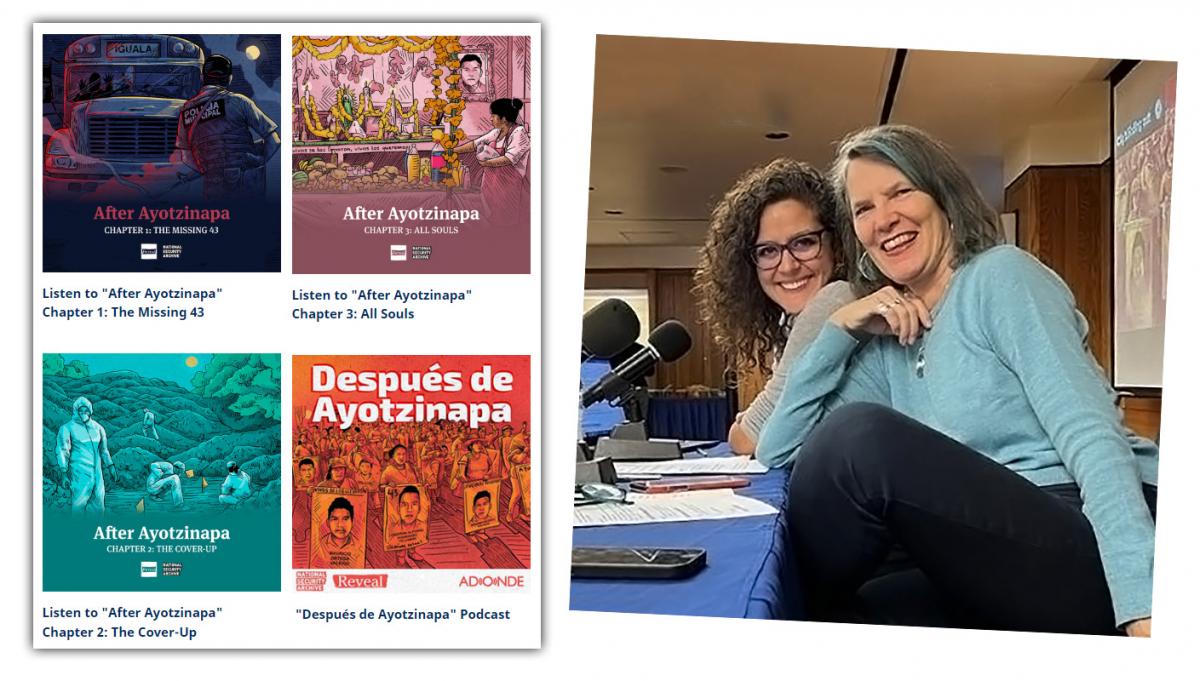Washington, D.C., April 3, 2023 - Investigative Reporters and Editors (IRE) today announced that the National Security Archive and its partner, Reveal from the Center for Investigative Reporting, are winners of a 2022 IRE Award for “Longform Journalism in Audio” for producing the After Ayotzinapa podcast.
In selecting After Ayotzinapa for the award, IRE judges called it “a jaw-dropping chronicle of a horrendous crime and the lengths that Mexican authorities went to cover it up.”
After Ayotzinapa is the story of the 2014 disappearance of 43 students from the Ayotzinapa rural college in Guerrero, Mexico, and their parents’ demands for justice; the Mexican government’s botched investigation and cover-up; and the role that the U.S.-Mexico “war on drugs” played in contributing to the violence and impunity that led to the crime.
The Archive has been investigating the Ayotzinapa case as part of the Mexico Project since 2015. In February 2020, Kate Doyle and Reveal’s Anayansi Díaz-Cortes began reporting on it together for their podcast. Over the course of two years, they traveled from New York and San Francisco to Mexico City, Guerrero, Chicago, and Washington, D.C., interviewing dozens of people and examining thousands of pages of documents.
IRE’s full comments accompanying the award announcement read: “An extraordinary exploration of the forced disappearances of college students in Mexico filled with inside information, public records, critical relationships with sources, clear and compelling storytelling, archive audio, creative approaches, significant results, and a disturbing window into corruption in Mexico fueled by drug cartels. After Ayotzinapa is a jaw-dropping chronicle of a horrendous crime and the lengths that Mexican authorities went to cover it up. Through journalistic persistence that spanned years and borders, After Ayotzinapa lands like a gut punch, holding powerful Mexican institutions and political figures to account.”
The Archive’s executive director Tom Blanton commented on the award: “Years of sustained and courageous investigation produced this award-winning podcast, and it shows. Listeners are left on the edge of their seats at the end of each episode, given the cover-up exposed by Kate Doyle and Reveal.”
The National Security Archive is grateful to many friends and colleagues for their support during the making of After Ayotzinapa, including Reveal’s Taki Telonidis and Kevin Sullivan, former executive producer of Reveal, as well as Conrad Martin, The James and Kinsella Family Fund, and The Ford Foundation. A full list of acknowledgements can be found here.
Quotes from Investigative Reporters and Editors Inc.
Announcing the 2022 IRE Award winners & finalists
“The winners of the 2022 IRE Awards reflect the undeniable tenacity of journalists working day in and day out to hold powerful people and systems accountable,” said Barbara Rodriguez, chair of the IRE Awards contest committee. “Through a combination of narrative storytelling, data and compelling visuals, many of the entries this year put a spotlight on the lives of everyday people and showed the public the high stakes of policy choices on those lives. This year we also saw newsrooms fight hard to uncover information that some officials attempted to keep hidden. There were also efforts to keep journalists safe in dangerous conditions — and honor their legacy posthumously. Congratulations to the winners and finalists.”
Longform Journalism in Audio (two winners):
“After Ayotzinapa,” Reveal from The Center for Investigative Reporting, National Security Archive, Adonde Media, Anayansi Diaz-Cortes, Kate Doyle, Taki Telonidis, Maria Martinez Castro
Judges' comments: An extraordinary exploration of the murders and disappearances of college students in Mexico filled with inside information, public records, critical relationships with sources, clear and compelling storytelling, archive audio, creative approaches, significant results, and a disturbing window into corruption in Mexico fueled by drug cartels. “After Ayotzinapa” is a jaw-dropping chronicle of a horrendous crime and the lengths that Mexican authorities went to cover it up. Through journalistic persistence that spanned years and borders, “After Ayotzinapa” lands like a gut punch, holding powerful Mexican institutions and political figures to account.
“Sold a Story: How Teaching Kids to Read Went So Wrong,” American Public Media, Emily Hanford, Christopher Peak, Catherine Winter, Chris Julin, Emily Haavik
Judges' comments: American Public Media presents an extraordinary example of investigative reporting at its best, with extensive use of documents, data, studies, sourcing, accountability, archive audio, and even a survey. The writing is clear and compelling, despite a complicated subject, and the use of archive audio accentuates the storytelling and gives the findings additional heft. The investigation addresses a subject critical to all parents: how do children learn to read, why are so many having difficulty, and why is the system that has been widely accepted failing to do the job for many? The result is a story focused on flaws in the public school system, and deeper questions about the operation and values of schools, and of private companies profiting from education. Emily Hanford’s reporting and presentation are testaments to journalistic and audio storytelling excellence.

